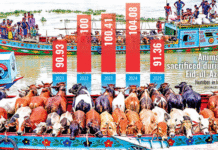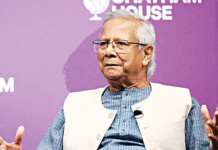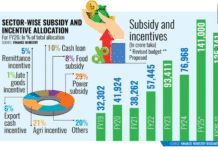The main challenge of the upcoming budget is to take measures to stimulate private investment that remained stagnant for last few years, economists and businessmen said in Dhaka yesterday.
They urged the government to present a credible budget, also focusing on education, health, employment generation and infrastructure development.
Their observations came at a discussion meeting on “Upcoming Budget: Promises and Challenges” organised by the Economic Reporters’ Forum (ERF).
A host of economists and business leaders took part in the pre-budget discussion. Senior journalist Farid Hossain moderated the meeting where ERF president Sultan Mahmud was present.
Centre for Policy Dialogue distinguished fellow Debapriaya Bhattacharya said private investment falls below 1% of GDP for the first time, which is unimaginable, and public investment to GDP is also weak.
Considering the situation, he said, “The basic problem is that investment remained stagnant.”
He said many hoped that the political violence in the run up to the general election on January 5 has made investment sluggish but this is not true. “The fact is that slow investment begins from the starting of the second half of 2012-13 financial year,” he said.
He said suspended production resumed, but no new investment was added after the political violence due to persisting political uneasiness.
Former finance adviser to the caretaker government Mirza Azizul Islam said it has been apprehended that present political situation might not last long, making investment slower.
“It is notable that whether this situation indicates lulls before storm. Political stability is pre-requisite to rid investment sluggishness,” he said. He said if political situation is not improved, potential investment with incentives is unlikely to work.
He stressed the need for ensuring credibility in the budget, which he would like to estimate it should be of Tk234,000 crore taking into account the non-NBR and non-tax revenue. “So, the government needs to be careful about this.”
The ADP size should not be not more than Tk66,000 crore to Tk67,000 crore, he added.
Dr Binayak Sen, research director at Bangladesh Institute of Development Studies (BIDS), emphased on developing infrastructure on priority basis. “To boost investment, the budget should focus on infrastructure development and building image of the country for retaining low wage competitive edge.”
Becoming a middle income country by 2021 would bring qualitative changes in the people’s life – this concept is not true, he said. “Our next door neighbour India has become middle income country, but it is still beset with poverty, malnutrition, and income disparity. “Middle income country means zero extreme poverty and nutrition deficiency.”
Sen suggested bringing changes in tax structure putting importance on imposing direct tax in the budget for increased revenue income.
Former Bangladesh Bank Governor Dr Salehuddin Ahmed said four things – investment, poverty alleviation, employment generation and equal distribution of resources – should be given priority in the budget.
“We need to come out from incremental budget. Every year budget size increased but was not implemented. It is like a ‘pie in the sky’,” he said.
He recommended increasing allocation in health and education sector to ensure basic needs of the people. “Allocation in these sectors in the budget is falling.”
Former NBR Chairman Abdul Mazid said timeframe of the financial year should be changed to April-March from June-July.
Criticising poor governance in regulatory bodies and institutions, he said most important point is that weakness has engulfed financial sector, which affects real sector.
Former FBCCI president Abdul Awal Mintoo said the government talks big about becoming a middle income country soon. “But we need to know whether a middle income country improves lives of the people.”
He said the government institutions are now under the clutches of vested quarters, questioning their efficiency.
Bangladesh Garment Manufacturers and Exporters Association (BGMEA) President Atiqul Islam said big challenge is to relocate factories that have already been closed down, leaving more than 17,000 workers jobless due to visual inspection by the Accord and Alliance inspection team.
He demanded to ensure utility services for closed factories to save the workers’ lives.
Dhaka Chamber of Commerce and Industry (DCCI) President Shajahan Khan said: “We are concerned about a big budget as it might intensify tax burden on business.”
Source: UNBConnect









